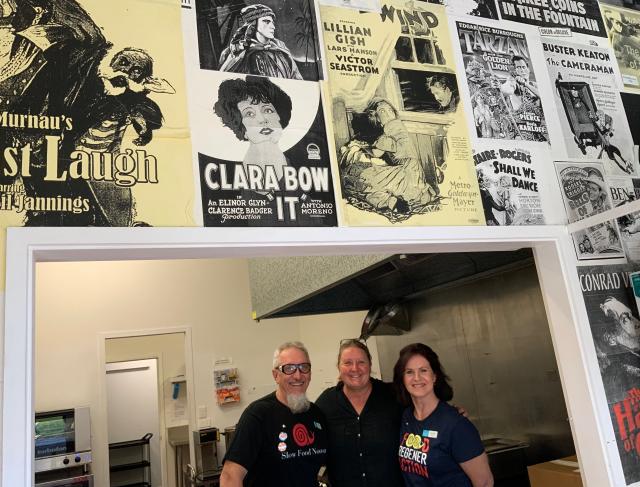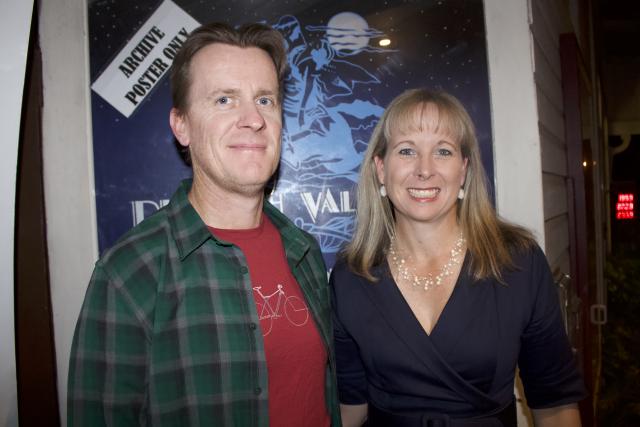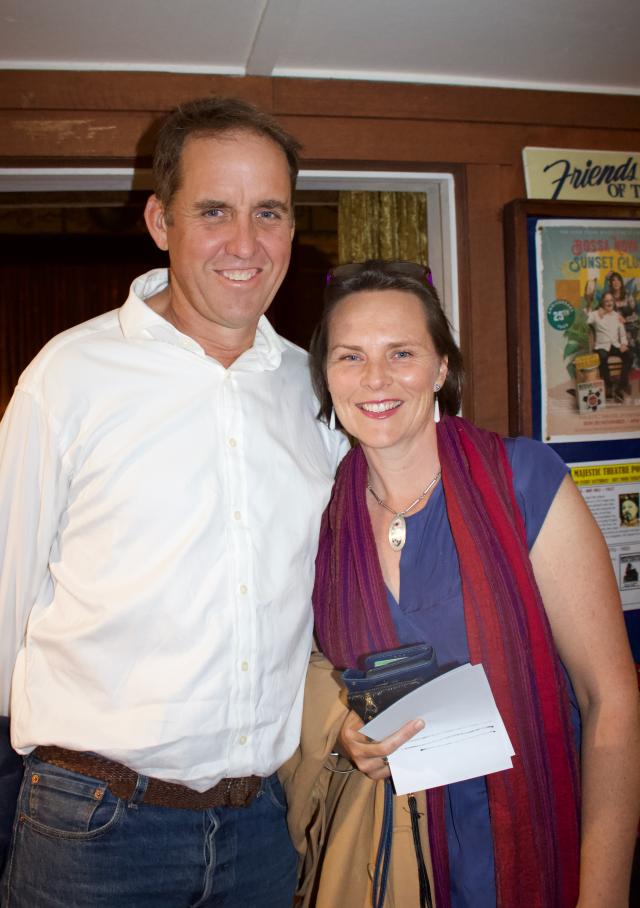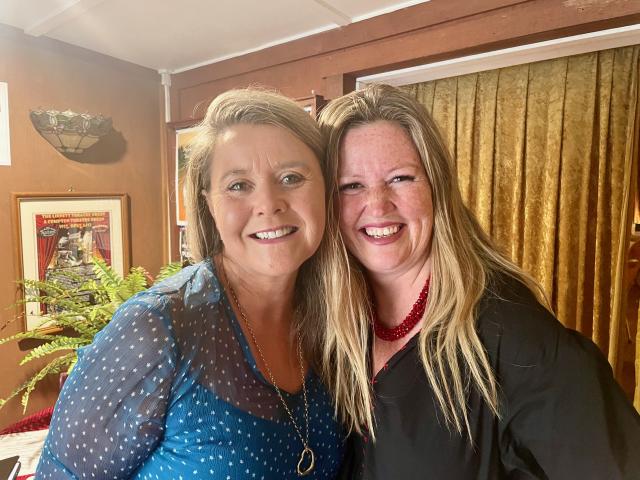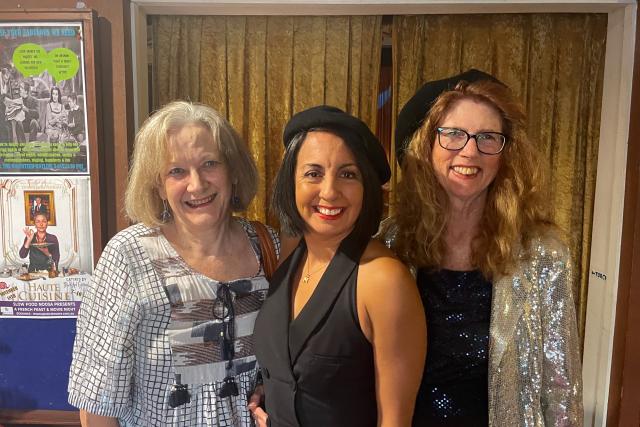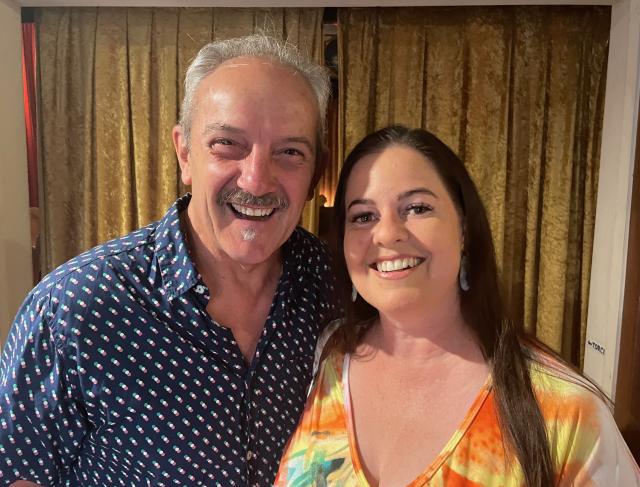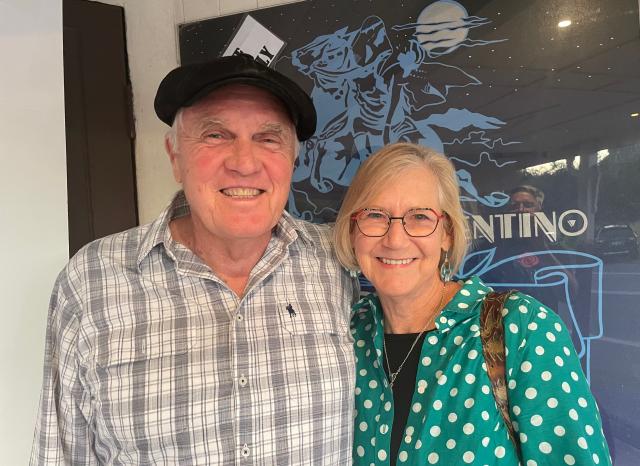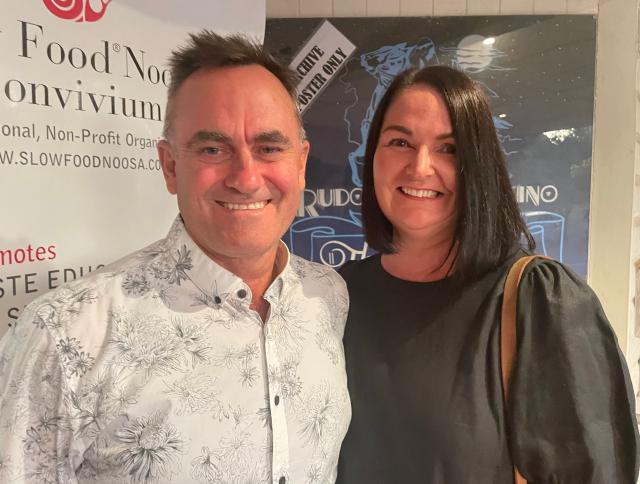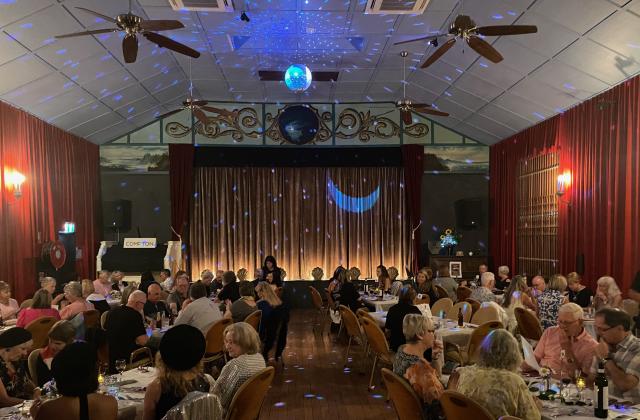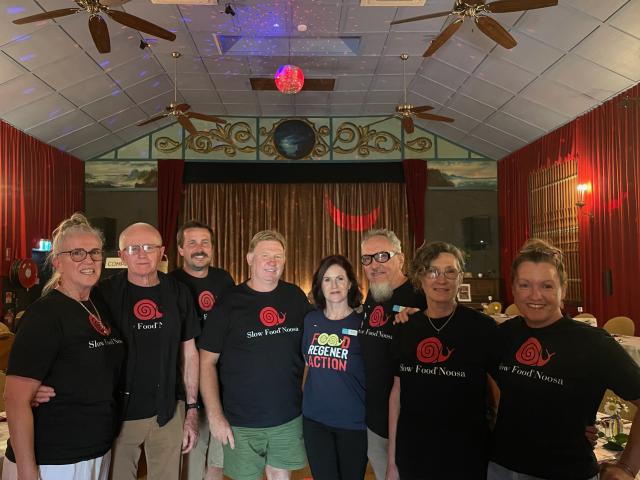
Slow Food Noosa delegates to world conference share their experiences at dinner and movie night. ERLE LEVEY was there to capture the flavour.
“In the hinterland a great number of businesses have earned the right to a Snail of Approval for clean, green and sustainable produce.”
Slow food just doesn’t taste good, it is good for you.
Fresh food is the pathway to good health.
Grown and presented in a good, clean and fair way, it is not just for you but for community.
It benefits the consumer, those who grow it, and the planet.
This is particularly so when you realise the benefits of the way money circulates through a local economy, and the impact of low food miles in the growing and distribution of produce.
A Slow Food Noosa movie and dinner evening at Pomona’s historic Majestic Theatre on Friday highlighted the benefits of local food in sustaining a community.
The movie, Haute Cuisine, was accompanied by almost exclusively locally-grown produce catered for by Black Ant Gourmet of Kin Kin.
Slow Food Noosa president Jason Lewis welcomed guests to the French-themed evening and highlighted the fact that the people involved in putting on the event were those who Slow Food Noosa sponsored to attend attend the Terra Madre food festival in Turin, Italy, in September-October.
The festival, which brings delegates and food lovers together from more than 150 countries, highlights produce not just from the different regions of Italy but from around the world.
Noosa had the strongest representation from throughout Australia and what the delegates have brought back is the enthusiasm for such events, new ideas about the food industry, and how they can contribute through their commitment to Slow Food Noosa.
The knowledge that they gained also brought about the realisation of the strength of the food industry in the Noosa, Cooloola, Mary Valley and Gympie regions, along with the Maleny, Montville, Mapleton areas.
It highlighted the fact that we can hold our heads high in regard to quality and innovation as well as diversity of product.
What the Italians showed was the passion they hold for food, built up over many generations – its production and presentation. As well as the respect in which they hold farmers and producers.
As one of only two Australian media delegates to the conference, for me it highlighted the inspiration needed for good food, the benefits of local produce … the value of sincerity rather than frivolous and decorative, especially when it comes to the presentation of food.
Mushroom grower Scott Andrews of Tagigan Road Produce at Goomboorian, said the region could hold its own on the world stage in regard to food and needed to stand behind that growing reputation.
“We do amazing food,’’ he said. “There are so many good restaurants, which is something you don’t necessarily see when you go abroad.
“The Italians though are so passionate and proud about what they do. And they do it very well.
“Food diversity has not been as prominent as our efforts and has not had as great an impact as in Australia – as they haven’t had the same boiling pot of cultures through migration as we have.
“They are old cities that have always done it that way … traditional ways.
“They do things really well.
“Yet we do amazingly, while not focussing or concentrating on certain things … we tend to go for a broader range or style of dishes.
“We do not compete all on that one style.
“In Turin their market is traditional Italian food. It is not a tourist city at all, so why branch out when it’s not their market.
“They’re not concerned about what other people think.
“When you come back to our own produce I make sure I only send out the highest quality, and I can be proud of it.
“I’m not worried about generating 10 or 20 percent more sales for that week. My quality is so high.
Swapping notes with some of best mushroom growers and chefs in Italy, Scott regarded we were as good as any.
“The mushroom world in Italy is a little bit different to here, as it is a natural mushroom environment.
“They are foraged for rather than grown in a farmed environment.
“It’s different in that context, but to show pictures and exchange words and ideas on what I grow, they were like ’Wo!’
“That opens their eyes to a different world of what’s possible when you don’t have those perfect growing conditions like they do.
“To see what’s possible.’’
Jodie Williams at Black Ant Gourmet has been cooking in Noosa since the age of 13.
Having learned through some of Noosa’s best chefs, including famous French chefs, she went on to create her own catering business.
Then in 2013 Jodie renovated the old Kin Kin General Store and created Black Ant Gourmet, stocking mainly locally grown produce.
Having started growing everything from chickens and ducks to pork, lamb and beef, she still has beef and does the greens, the garnishes and fruits in the subtropical garden.
For the menu on Friday night Jodie chose eggs and livers by Bunya Grove at Amamoor; beef and mushrooms by Eastwell Farms at Kin Kin; chicken by Forage Farms at Kybong; local greens and yams by PermEco, and lemons, herbs and garnish grown at Black Ant.
In organising the movie and dinner evening Andy Coates and Nicola Cleaver of Amrita Park Meadery at Pomona said planning started before the Italy trip.
“We were looking at different events to hold for Slow Food Noosa and I knew about the Majestic,’’ Andy said.
“We have been to a couple of events here and it was a no-brainer.
“In the hinterland a great number of businesses have earned the right to a Snail of Approval for clean, green and sustainable produce.
“This was something not Noosa based so much but in the hinterland.
“We wanted to keep everything fair for everybody.
“Slow Food is reminding people of that sense of community.
“Most are wanting to do the right thing.
“This is good for you at all levels … it’s an awareness of things that can be produced in your community and you may not have been aware of.
“You may only look at what’s on a menu instead of choosing a menu that’s seasonal … what’s available in the area.
“It always tastes good if it’s in season.’’
Di Seels, who encourages nature in the classroom at schools in the Noosa and hinterland areas, said the main lesson gained from Turin was the need to be respectful, kind and caring … to be grateful.
Italy showed the collective power of the family. The connectivity.
“The ability to slow down, slow eating, slow travel and the enjoyment that comes with it.
“It’s not just the siesta they enjoy, it’s the connection … the whole package.’’
Di said poor food choices could lead to a decline in childrens’ behaviour and well-being.
Slow Food is about promoting something that is not just in your 9-5 working day.
It makes you aware of something bigger, and the outcomes are so massive
“It goes back to childhood,’’ Di said. “To family dinners, laughter, and happiness.
“To making sourdough from scratch.
“In Italy this is a generational thing with recipes handed down.’’
University of Sunshine Coast associate business lecturer Melissa Innes, who presented at Turin on the benefits of forward vision and shared knowledge, said there was no question about why the Slow Food movement originated in Italy.
“It makes total sense. A country where people truly understand the value of quality food, company and what the land can produce when carefully managed over centuries.
“Take time to talk to any local Italian working in hospitality and you’ll discover the in-grained culture of passion for food, and life in general.
“In fact, the Italians have a way of making you feel like they’re not working at all.
“Instead, they’re investing time in something they’ve grown to appreciate, savour and love – producing food, serving food and celebrating food. And wine of course.’’
Melissa said that as you travel around the scenic and sometimes ruggedly beautiful country – if you listen carefully, you will hear centuries-old stories of family farming culture.
Stories about farming methods, family commitment, and the ways in which communities and villages have supported, nurtured and respected food production through time.
“That’s why Slow Food – a global organisation embracing 160 countries – was born in Italy.
“The Italians truly understand the importance of food production, supply, and sustainability in people’s lives.
“Slow Food encourages local, fresh produce, with producers working directly with restaurateurs and other distributors using quality ingredients with farming practices that look after the land and promise a food and farming future for generations to come.’’
The journey to Turin for Terra Madre held some surprises for the Australian delegates and ambassadors.
For Noosa committee member Rod Lees, who has been to three Terra Madre festivals now, it was there that he really got the idea of the depth of it all on such an international scale.
“Turin was where we discovered the Snail of Approval concept.
“That was a significant thing for Noosa and the hinterland.
“Our approach is based on a concept of food that is defined by three interconnected principles: good, clean and fair.
“Good quality, flavoursome and healthy food.
“Clean production that does not harm the environment.
“Fair – accessible prices for consumers and fair conditions and pay for producers.
“If businesses and producers qualify on those counts they are recognised with the Snail of Approval.’’
What impressed Di Seels was the time and the knowledge people would share.
At the final dinner of the Slow Food Noosa delegates in Turin, she said the waiter was incredibly generous of his time.
“That comes from a place in your heart.
“It’s a cultural thing that runs through generations.
“What stood out was the connection we all had at the end as a group.
“It showed there is so much scope for Slow Food here … Italy is living proof.
“It made me aware of a much bigger picture.
“We need to utilise the experience.’’
Judging by the way the Turin delegates and committee members worked together at Pomona to present a heartfelt experience, we can look forward to some inspiring, passionate and productive Slow Food events in the future.

